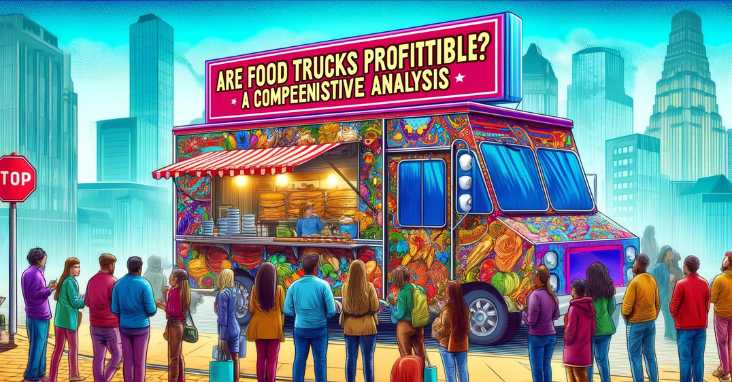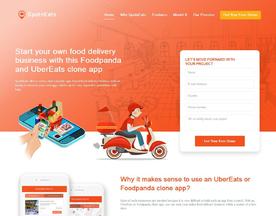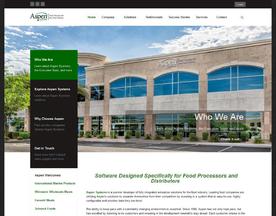Are food trucks profitable? Yes, food trucks can be profitable with proper location, unique menus, and effective management, despite initial costs and ongoing expenses.
Food trucks have become a popular trend in the food industry, with entrepreneurs flocking to the streets to set up their mobile kitchens. While the idea of owning a food truck may seem appealing, the question of profitability remains. Are food trucks profitable? The answer is not straightforward, as there are several factors that influence the financial success of a food truck business.

Understanding Are Food Trucks Profitable is the first step in determining whether this business venture is worth pursuing. Initial Investments, Ongoing Operating Costs, Legal and Administrative Expenses, Sales and Marketing Strategies, Operational Management, Financial Planning and Analysis, Challenges and Considerations all play a significant role in the profitability of a food truck business. Entrepreneurs must consider each of these factors when deciding whether to invest in a food truck business.
According to a report by the National Restaurant Association, the food truck industry is expected to generate $1.2 billion in revenue by 2022. While this may sound promising, it is important to note that not all food trucks are profitable. The success of a food truck business depends on several factors, including the type of cuisine offered, location, and competition. In this article, we will explore the various factors that influence the question are food trucks profitable businesses and provide insights into how entrepreneurs can maximize their chances of success.
Key Takeaways
- The profitability of a food truck business depends on several factors, including initial investments, ongoing operating costs, legal and administrative expenses, sales and marketing strategies, operational management, financial planning and analysis, challenges and considerations.
- The food truck industry is expected to generate $1.2 billion in revenue by 2022, but not all food trucks are profitable.
- Entrepreneurs must carefully consider each factor that influences profitability and develop strategies to maximize their chances of success.
Understanding Are Food Trucks Profitable ?
Food trucks have become increasingly popular in recent years, with many entrepreneurs seeing them as a low-cost way to start a food business. However, before investing in a food truck, it is important to understand the profitability of this business model.
Defining Profit Margins
Profit margin is the percentage of revenue that a business keeps after deducting all expenses. This is an important metric to consider when evaluating the profitability of a food truck. According to Investopedia, a good profit margin for a food truck business is between 10% and 20%.
Average Food Truck Revenue
The average revenue for a food truck can vary widely depending on location, menu, and seasonality. According to Food Truck Empire, the average revenue for a food truck is between $250,000 and $500,000 per year. However, this can be higher or lower depending on the factors mentioned above.
Net Profit Margin
Net profit margin is the percentage of revenue that a business keeps after deducting all expenses, including taxes. This is a more accurate measure of profitability than profit margin. According to Small Business Trends, the average net profit margin for a food truck is between 6% and 8%.
In conclusion to the question are food trucks profitable, while food trucks can be profitable, it is important to carefully consider all expenses and revenue potential before investing in this business model. By understanding profit margins, average revenue, and net profit margin, entrepreneurs can make informed decisions about the viability of a food truck business.
Initial Investments

Starting a food truck business requires a significant initial investment. Entrepreneurs must consider several factors, including startup costs, equipment, initial inventory, and supplies. In this section, we will delve into each of these factors.
Startup Costs
The cost to start a food truck can vary widely depending on the location, size of the truck, and the type of food being served. According to Food Truck Empire, the average cost to start a food truck is between $40,000 and $200,000. This includes the cost of the truck, permits, licenses, insurance, and legal fees.
Purchasing Equipment
Kitchen equipment is essential for any food truck business. The cost of equipment can range from a few thousand dollars to tens of thousands of dollars. It is crucial to invest in high-quality equipment that can withstand the wear and tear of daily use. According to Mobile Cuisine, the average cost of kitchen equipment for a food truck is around $25,000.
Inventory and Supplies
Inventory management is critical to the success of any food truck business. Initial inventory and supplies can cost several thousand dollars, depending on the type of food being served. It is essential to source quality ingredients and products to ensure customer satisfaction. According to Food Truck Operator, proper inventory management can help reduce waste and increase profits.
In conclusion, are food trucks profitable? Starting a food truck business requires a significant initial investment. Entrepreneurs must carefully consider startup costs, equipment, and inventory management to ensure success. By investing in quality equipment and ingredients, food truck owners can increase their chances of profitability.
Ongoing Operating Costs
Running a food truck business requires ongoing operating costs that must be taken into account when calculating profits. These costs can vary depending on the size of the business, location, and menu offerings. Here are some of the most common ongoing operating costs that food truck owners need to consider:
Labor and Wages
Labor costs are one of the biggest expenses for food truck owners. This includes wages for employees, as well as taxes and benefits. Depending on the size of the business, food truck owners may need to hire additional staff to help with food preparation, cooking, and serving. It is important to ensure that labor costs are factored into the pricing of menu items to avoid losing profits.
Food and Ingredients
Food and ingredients are another significant expense for food truck owners. It is important to source high-quality ingredients while keeping costs low to maintain profitability. This may involve negotiating prices with suppliers or finding alternative sources for ingredients. Additionally, food truck owners need to be mindful of food waste and manage inventory carefully to avoid spoilage.
Fuel, Utilities, and Rent
Fuel, utilities, and rent are other ongoing operating costs that food truck owners need to consider. Fuel costs can vary depending on the distance traveled and the size of the food truck. Utilities may include expenses such as electricity, water, and propane. Rent may include fees for parking spaces, permits, and other regulatory requirements.
To keep these costs under control, food truck owners need to carefully monitor their monthly operating costs and operational expenses. This can involve creating a budget and tracking expenses regularly to identify areas where costs can be reduced. By managing overhead expenses effectively, food truck owners can increase their profits and build a successful business.
For more information on are food trucks profitable, check out this article from Forbes.
Legal and Administrative Expenses

Starting and running a food truck business involves a range of legal and administrative expenses. These expenses can vary depending on the location of the business and the types of food served. Here are some of the key legal and administrative expenses that food truck owners should be aware of.
Licenses and Permits
Obtaining the necessary licenses and permits is a crucial step in starting a food truck business. These permits may include health department permits, business licenses, and parking permits. The cost of these permits can vary depending on the location of the business and the type of permit required. For instance, a food truck owner in Los Angeles may need to spend around $1,000 per year on permits alone.
Insurance and Taxes
Food truck owners are also required to have insurance coverage, which can include general liability insurance, commercial auto insurance, and workers’ compensation insurance. The cost of insurance can vary depending on the size of the business and the type of coverage required. Additionally, food truck owners are responsible for paying taxes, such as sales tax and income tax.
To learn more about are food trucks profitable and the legal and administrative expenses involved in starting and running a food truck business, check out this guide by Nolo, a trusted source for legal information.
Sales and Marketing Strategies
Effective Pricing
One of the most important factors that determine the success of a food truck is its pricing strategy. The food truck owners need to set the right prices for their products to attract customers and generate profits. The effective pricing strategy should consider the cost of ingredients, the competition, and the target market.
For instance, if the food truck is targeting a high-end market, it can set higher prices for its products. On the other hand, if it is targeting a low-income market, it may need to set lower prices to attract customers. The food truck owners can also consider offering combo deals or discounts to attract more customers.
Leveraging Social Media
Social media is a powerful tool that can help food truck owners reach a wider audience and promote their products. By leveraging social media platforms like Facebook, Twitter, and Instagram, food truck owners can create an online presence and engage with their customers.
They can use social media to post pictures of their products, announce their location and schedule, and run promotions and contests. They can also use social media to gather feedback from their customers and improve their products and services.
Building a Brand
Building a strong brand can help food truck owners differentiate themselves from their competitors and establish a loyal customer base. The food truck owners can create a unique brand identity by designing a logo, creating a catchy tagline, and developing a consistent visual style.
They can also focus on providing high-quality products and excellent customer service to build a positive reputation. By building a strong brand, food truck owners can increase their visibility and attract more customers.
To learn more about effective sales and marketing strategies to know are food trucks profitable, check out this article from Forbes Business Council.
Operational Management

Operating a food truck requires effective management of resources, including location, menu, inventory, and supply chain. In this section, we will discuss the key aspects of operational management that food truck owners need to consider to maximize their profitability.
Location and Foot Traffic
The location of a food truck is critical to its success. A prime location with high foot traffic can generate significant revenue. However, finding the right location can be challenging, especially in a competitive local food scene.
Food truck owners should research potential locations, such as local festivals, fairs, and events, to identify areas with high foot traffic. Additionally, they should consider the demographics of the area and the types of food that are in demand.
According to FoodTruckEmpire.com, food truck owners should also consider the following factors when selecting a location:
- Visibility
- Accessibility
- Parking
- Safety
- Permits and regulations
Menu Optimization
The menu is the heart of a food truck’s business. It is essential to offer a menu that is both appealing to customers and profitable for the business. Food truck owners should regularly review their menu items to identify which items are popular and which are not.
They should also consider the cost of ingredients, preparation time, and the selling price of each item to ensure that they are profitable. Additionally, they should consider seasonal trends and local food scenes to offer menu items that appeal to customers.
According to Mobile-Cuisine.com, food truck owners should also consider the following factors when optimizing their menu:
- Menu design and layout
- Portion sizes
- Pricing strategy
- Specials and promotions
- Customer feedback
Inventory and Supply Chain
Effective inventory and supply chain management is critical to the success of a food truck business. Food truck owners need to ensure that they have enough inventory to meet demand without wasting food or money.
They should also establish relationships with reliable suppliers to ensure that they can obtain high-quality ingredients at a reasonable cost. Additionally, they should consider the shelf life of ingredients and the storage space available in their food truck.
According to Restaurant.org, food truck owners should also consider the following factors when managing their inventory and supply chain:
- Ordering and delivery schedules
- Quality control
- Vendor relationships
- Food safety and sanitation
- Waste reduction
Overall, are food trucks profitable? Effective operational management is critical to the success of a food truck business. Food truck owners need to consider multiple factors, including location, menu optimization, and inventory and supply chain management, to maximize their profitability.
Financial Planning and Analysis

Budgeting and Forecasting
Budgeting and forecasting are essential components of financial planning for the question are food trucks profitable. A budget is a financial plan that outlines the expected income and expenses for a specific period. Forecasting, on the other hand, involves predicting future sales and expenses based on past trends and market conditions. By creating a budget and forecast, food truck owners can better manage their finances and make informed decisions about their business.
To create a budget and forecast, food truck owners should consider their expected sales volume, food truck expenses, and other financial obligations such as loan repayment and debt management. They should also monitor their sales volume regularly to ensure that they are meeting their targets and adjust their budget and forecast accordingly.
Monitoring Sales Volume
Monitoring sales volume is crucial for food truck owners to understand their business’s financial health. Food truck owners can track their sales volume by keeping a record of daily sales and comparing them to their budget and forecast. By doing so, they can identify trends in sales and adjust their budget and forecast as needed.
Food truck owners can also use technology to monitor their sales volume. For example, they can use point-of-sale systems that track sales and inventory in real-time. This information can help food truck owners make informed decisions about their business and adjust their budget and forecast accordingly.
Loan Repayment and Debt Management
Food truck owners may need to take out loans to start or expand their business. However, loan repayment and debt management are critical components of financial planning for food trucks. Food truck owners should ensure that they can make their loan payments on time and manage their debt effectively.
To manage their debt, food truck owners should create a debt repayment plan and prioritize their debts based on interest rates and payment terms. They should also consider refinancing their loans to lower their interest rates and reduce their monthly payments.
In conclusion, financial planning and analysis are critical for the success of the questions are food trucks profitable. By creating a budget and forecast, monitoring sales volume, and managing their debt effectively, food truck owners can better manage their finances and make informed decisions about their business. For more information on financial planning and are food trucks profitable, check out this resource from Nolo.com.
Challenges and Considerations

Running a food truck business can be a lucrative venture, but it is not without its challenges and considerations. Here are some of the factors that food truck owners need to keep in mind:
Weather and Seasonality
One of the biggest challenges that food truck owners face is the weather. Rain, snow, or extreme heat can significantly impact sales. In addition, food trucks are often seasonal businesses, with sales dropping off in the winter months. Food truck owners need to plan accordingly, both in terms of their menu offerings and their finances.
According to a study by Intuit, food truck sales tend to be highest during the summer months, with July being the busiest month. However, food truck owners may be able to boost sales during the off-season by offering catering services or partnering with local businesses.
Competition and Market Trends
Competition is another challenge that food truck owners need to be aware of. With the growing popularity of food trucks, more and more entrepreneurs are entering the market. In addition, food trends can change quickly, and food truck owners need to be able to adapt to stay relevant.
To stay ahead of the competition, food truck owners should keep an eye on market trends and adjust their menu offerings accordingly. They should also consider partnering with other food trucks or local businesses to increase their visibility and reach new customers.
Scalability and Growth
Finally, food truck owners need to think about scalability and growth. While starting a food truck business can be relatively easy and inexpensive, scaling up can be more challenging. Food truck owners need to think about how they can expand their business without sacrificing quality or profitability.
One option is to invest in additional trucks or expand into a brick-and-mortar location. Another option is to focus on catering or events. By diversifying their revenue streams, food truck owners can increase their chances of long-term success.
In conclusion, running a food truck business can be a rewarding and profitable venture, but it is not without its challenges. By keeping these factors in mind and staying up-to-date with market trends, food truck owners can increase their chances of success in the competitive local food scene.
Here is a resource with more information on are food trucks profitable and starting and running a food truck business in the United States.
Conclusion

In conclusion, are food trucks profitable business ventures? If executed properly. However, the profit margins are highly dependent on factors such as location, menu pricing, and business model.
A well-planned food truck business plan can help increase the chances of success in the mobile food business. It is important to consider the costs involved in starting a food truck business, including the initial investment in the truck and equipment, as well as ongoing expenses such as permits, licenses, and supplies.
Compared to a brick-and-mortar restaurant, a food truck business has lower overhead costs and can be more flexible in terms of location and hours of operation. However, the limited space and resources of a food truck can also pose challenges for menu planning and food preparation.
It is important for food truck owners to have a clear understanding of their target market and competition in the area. Developing a unique and appealing menu can help attract customers and increase sales.
Overall, while there is potential for profit in the food truck industry, it is important to carefully consider the factors involved and develop a solid business plan. For more information on starting a food truck business and are food trucks profitable, check out this resource from the Small Business Administration.
Frequently Asked Questions

What is the average income for a food truck per day?
The average income for a food truck per day can vary greatly depending on several factors such as location, cuisine, and foot traffic. According to Food Truck Empire, a popular resource for food truck owners, the average food truck can make anywhere from $250 to $500 per day.
How much can a food truck owner expect to make in a month?
Again, the amount a food truck owner can make in a month can vary based on the same factors as daily income. However, Business Insider reports that some food truck owners can make up to $20,000 per month.
What are the initial costs associated with starting a food truck?
The initial costs of starting a food truck can also vary depending on several factors such as the condition of the truck, equipment needed, and permits required. The Balance Small Business estimates that the average cost to start a food truck business ranges from $40,000 to $200,000.
What is the most profitable food truck cuisine?
The most profitable food truck cuisine can also vary based on location and demand. However, Roaming Hunger reports that some of the most popular and profitable food truck cuisines in America include Mexican, burgers, and barbecue.
What are common financial challenges faced by food truck owners?
Common financial challenges faced by food truck owners can include high operating costs, limited access to capital, and unpredictable sales. Forbes suggests that food truck owners should have a solid financial plan in place to address these challenges.
How do food truck sales trends affect profitability?
Food truck sales trends can have a significant impact on profitability. For example, Mobile-Cuisine reports that the trend towards healthier eating options has led to an increase in demand for vegetarian and vegan food trucks. Keeping up with industry trends and adjusting menus accordingly can help food truck owners stay profitable.












